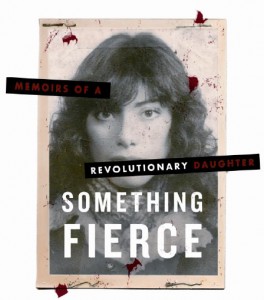Tags abbreviated audio, audio, audio book, autobiography, biography, blog, book, history, Jo Anna Perrin, memoir, narration, narrator, nonfiction, politics, review
Something Fierce: Memoirs of a Revolutionary Daughter
Winner of Canada Reads 2012
Narrated By: Carmen Aguirre
Published By: Post Hypnotic Press Audiobooks
Length: Unabridged 9 Hrs. 36 Min.
Something Fierce: Memoirs of a Revolutionary Daughter is the winner of Canada Reads 2012. It is the account of Vancouver actor, director and playwright Carmen Aguirre a child of Chilean revolutionaries who herself became an active member of the underground resistance during Pinochet’s dictatorship in 1980’s Chile, the war in Peru, the dictatorship in Bolivia, and further unrest in Argentina.
In Chile in 1973, a brutal coup removed the democratically elected socialist president Salvador Allende from office , ushering in the cruel dictatorship of General Augusto Pinochet and his oppressive administration. Human rights abuse flourished as countless citizens went missing, were arrested, tortured and killed. Harkening back to another insidious era in history concentration camps to rival Hitler’s Grand Plan were built, the mere threat of which was enough to bolster a regime of tyranny and submission.
Shortly after the bloody coup which deposed the much loved Allende, six-year-old Carmen Aguirre and her younger sister Ale, children of parents working for the resistance, were forced to flee with their family to Vancouver where they began new lives as exiles. For the next five years, Carmen and Ale live relatively normal lives, while their parents continued to aid Chile’s underground movement from a protected distance, operating as a safe house for other members of the underground. The girls were able to live, for the most part, typical teenage lives of boys, music and fashion only tangentially aware of the crises back home. However when Carmen was eleven, all that changed.
Sometime in 1978, the Chilean resistance issued a call for exiled activists to return to Latin America anew and bolster the fight for social justice and reform. Many returning exiles sent their children to live with relatives or other supporters, but Carmen’s mother could not give up her children and was determined to keep the family together. She wrenched her girls out of Vancouver and abruptly returned to South America to begin a new life in the resistance. Thus began roughly 10 years of Carmine’s double life as first her mother and stepfather, and eventually Carmen herself, set up safe houses and ran scheduled inter-country lower level missions for resistance members in Bolivia, Peru and Argentina.
In many ways, it is to those among us who have had a relatively typical American upbringing, what might seem at first blush a dysfunctional passage through childhood, adolescence and into young adulthood. We are a society that for the most part believes in the totality of our children, and in the case of refugees fleeing to a new and safer life, generally strive to keep those children away from whatever brutality might have been brought to bear in our own existence. Carmen grew up in a household dedicated to the cause of justice and the greater good by family that could not give up the fight, even when faced with the relative comfort of the North American way of life.
Having said all this, it might come as a surprise when I also say that there is enormous humor in this book. This book is at heart a coming of age story. The upheaval of the political scene in South America serves as backdrop to the memoir, and I have to admit, my being ignorant in anything but the broader strokes of the geopolitical arena in Bolivian/Argentina/Peru and Chile of that era, made the more personal revelations of the dehumanizing tactics, the death camps, and rampant greed more distressing to me. But such is the scenario when we are shaken out of our personal comfort zones.
Nevertheless there is humor here at the foibles of the human condition, the fragility of flesh, the bourgeoisie desires of the consumer, and simply the basic necessity for humor in order to survive even the worst that humanity, and those among us who are less than human, dish out.
Aguirre is adept at muting cold facts when told from the recollections of, at first, a confused and moody preteen more concerned with general teenage angst and her nascent sexuality, and more chilling when Carmen the child begins her journey into young adulthood and decides to volunteer herself to work in the resistance. The physical terror of torture and capture which she spends years anticipating, and providentially escapes, pales to the emotional terror which is part and parcel of complete service to a cause. At the age of 21, when the resistance movement largely collapses, she is left physically manifest of the years of the mental torture of the unknown, the constant threat of living under false papers and identities, and the threat of exposure. Yet, she never loses her hope, and while the scars remain, she returns again to Vancouver, and goes on, as all real survivors do.
In terms of the audio version of the book, I have only one caveat which I impart to the prospective listener. This is a work narrated by its author, not a professional narrator. By that I mean, it is unfair to expect a fully blossomed “performance” if that is your penchant when delving into an audio book. This is an audio spoken honestly by the woman who lived this extraordinary life and the narration has moments of words over-emphasized flavored by humor self-realized, and excerpts of brilliance when Carmen allows herself to go there.
If you are a fan of memoir, biography/autobiography, history, politics, and coming of age non-fiction,, you will certainly not be disappointed by Something Fierce.
Thanks to Post Hypnotic Press Audiobooks for supplying a review copy of Something Fierce: Memoirs of a Revolutionary Daughter by Carmen Aguirre.


